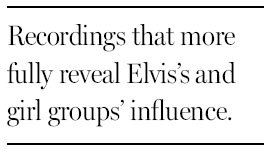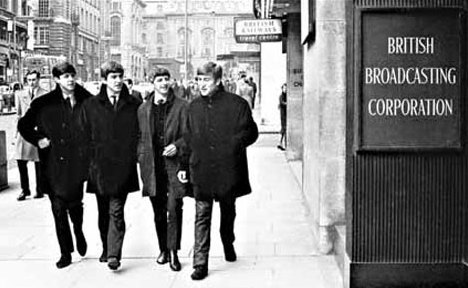Beatles bootlegs, with BBC banter
Updated: 2013-11-24 07:04
By Allan Kozinn(The New York Times)
|
|||||||
In the summer of 1971, one of the first Beatles bootlegs turned up, packaged in a white sleeve with "The Beatles - Yellow Matter Custard - Previously Unreleased Studio Material" stamped across it. It offered an odd lineup of tracks (performances of Ray Charles's "I Got a Woman"; Buddy Holly's "Crying, Waiting, Hoping"; Carl Perkins's "Sure to Fall (in Love With You)"; Arthur Alexander's "Shot of Rhythm and Blues"), 14 in all, in decent quality.
When a fan played the disc for John Lennon in 1972, he said it was the Beatles' failed Decca audition from a decade earlier. He was wrong. By the late 1970s, the recordings' provenance was established: The Beatles recorded these songs in 1963 for a BBC radio series, "Pop Go the Beatles."
The Beatles performed regularly for the BBC from 1962 to 1965. But on both sides of the Atlantic, the Beatles narrative focused instead on the group's amazing musical development, as captured in its EMI studio recordings.
|
Paul McCartney, George Harrison, Ringo Starr and John Lennon performed regularly on the BBC from 1962-65. Apple Corps Ltd. |
Yet the BBC was crucial to the Beatles' career. It presented the Beatles on its airwaves months before they had a record deal, and when it offered them "Pop Go the Beatles," the group had released only three singles and one LP.
A new release, "On Air - Live at the BBC, Vol. 2," and a reissue of its 1994 predecessor, "Live at the BBC" (both Apple/Universal), are a reminder of how important this material is to understanding what made the Beatles.
Consider that the Beatles' EMI studio output, from 1962 to 1970, amounted to 212 songs. At the BBC, they recorded 88 songs, most in multiple performances, for a total of about 280 tracks. Among the 88 are 36 songs, nearly three albums' worth, that the Beatles never recorded for EMI.
That's a significant chunk of repertory. Most are covers of American records, and though that may seem a drawback for a band distinguished by its songwriting, they reveal what most influenced the Beatles: namely, Motown hits, Chuck Berry, rockabilly (mostly Carl Perkins and Elvis Presley) and East Coast girl groups.
"Live at the BBC" includes 30 of the non-EMI 36. "On Air" adds two more - a rocked-up version of Stephen Foster's "Beautiful Dreamer" and Mr. Berry's "I'm Talking About You" - and a third, Perkins's "Lend Me Your Comb."

Because the BBC performances were essentially live in the studio, they are closer to the Beatles' live performances than to the carefully tweaked and polished EMI versions. Among the highlights of "On Air" are performances of "Anna," "Misery," "You Can't Do That," "Words of Love" and "Roll Over Beethoven" that are more sharply etched and more electrifying than the studio recordings.
Like "Live at the BBC," "On Air" draws heavily on bootlegs. The BBC recorded over its early 1960s tapes, so bootlegs are Apple's main sources.
The compilation includes plenty of the between-songs banter, which, given the Beatles' personalities, is amusing enough to bear repeated listening.
But these sets scrape the surface. At the rate Apple is working, it will take 80 more years for all the tracks to be released. Apple should rethink that. A complete edition of this extraordinary body of work is long overdue.
The New York Times
(China Daily 11/24/2013 page12)
